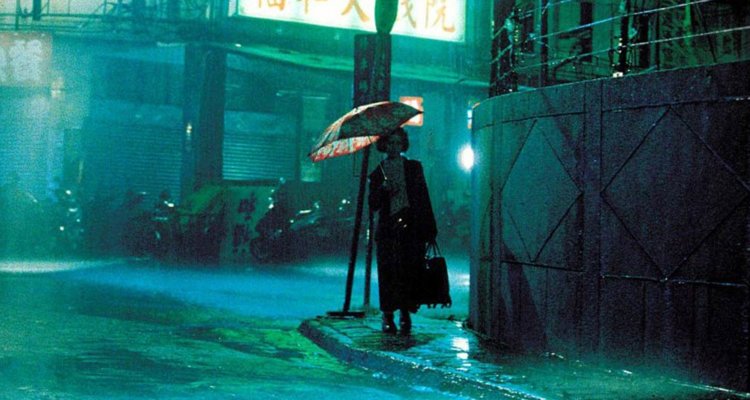Like Giuseppe Tornatore‘s “Cinema Paradiso” and its look at a fading movie theater, “Goodbye, Dragon Inn,” is a film for cinephiles that evokes feelings for cineastes, especially all of those missing the cinema these days. Directed by Taiwanese auteur and master filmmaker Tsai Ming-Liang, he of the slow, hypnotic mien of cinema, known for “The Hole” (FIPRESCI award winner at the 1998 Cannes Film Festival), and “Stray Dog” (Grand Jury Prize at the 70th Venice International Film Festival), “Goodbye, Dragon Inn” is about the last screening of the 1967 Taiwanese wuxia film, “Dragon Inn,” before the closure of an old movie theater. The New Yorker described the movie as a “requiem for a movie theatre.”
If you need a fuller appreciation of “Goodbye, Dragon Inn,” Fireflies Press has just the very thing: Nick Pinkerton’s Goodbye, Dragon Inn, the inaugural book in their Decadent Editions series that is out this week. Pinkerton is a Cincinnati-born, Brooklyn-based writer, and his work has appeared in Film Comment, Sight & Sound, Artforum, Frieze, Reverse Shot, and many more. Upcoming titles in the Decadent Editions series include Erika Balsom on James Benning‘s “Ten Skies” (2004), Dennis Lim on Hong Sang-soo‘s “Tale of Cinema” (2005), Melissa Anderson on “Inland Empire” (2006), and Rebecca Harkins-Cross on Lucrecia Martel’s “The Headless Woman” (2008).
We’re lucky enough to have two copies of the book to giveaway, a perfect gift for the cinephile in your household that enjoys smart, engaging, witty takes on arthouse classics.
Here’s the book synopsis:
Is cinema really dead? As movie houses close and corporations dominate, the art form is at risk of changing beyond recognition. In this wide-ranging and elegiac essay, Nick Pinkerton takes a deep dive into Tsai Ming-Liang’s 2003 film Goodbye, Dragon Inn, a modern classic haunted by the ghosts and portents of a culture in flux.
Here’s the film’s official synopsis from the Metrograph, who presented a new 4K restoration of the film late last year in New York.
Like the Royal Theater in The Last Picture Show and the title movie house in Cinema Paradiso, the Fu-Ho is shutting down for good. A palace with seemingly mile-wide rows of red velvet seats, the likes of which you’ve seen only in your most nostalgic dreams (though they’re beginning to fray), the Fu-Ho’s valedictory screening is King Hu’s 1967 wuxia epic Dragon Inn, playing to a motley smattering of spectators. The standard grievances persist: patrons snack noisily and remove their shoes, treating this temple of cinema like their living room, but as we watch the enveloping film deep into a pandemic, the sense that moviegoing as a communal experience is slipping away takes on a powerful and painful resonance. Yet Goodbye, Dragon Inn, released nearly two decades ago by the internationally acclaimed Tsai Ming-Liang (whose latest, Days, premiered at this year’s Berlinale), is too multifaceted to collapse into a simple valentine to the age of pre-VOD cinephilia. A minimalist where King Hu was a maximalist, preferring long, static shots and sparse use of dialogue, Tsai rises to the narrative challenges he sets for himself and offers the slyest, most delicate of character arcs (the manager, a woman with an iron brace on her leg, embarks on a torturous odyssey to deliver food to the projectionist, played by Lee Kang-sheng). By the time the possibility arises that the theater is haunted, we’ve already identified it as a space outside of time—indeed, two stars of Hu’s original opus, Miao Tien and Shih Chun, watch their younger selves with tears in their eyes, past and present commingling harmoniously and poignantly.
To win a copy of the book, all you have to do is follow The Playlist on Facebook, Instagram, and Twitter, and tweet: “I want to win the ‘Goodbye, Dragon Inn’ Giveaway from @ThePlaylist. #WinThePlaylistContest,” and include the URL of this story. Your final step: email us your tweet to playlistcontests@gmail.com, with your full name and address.


